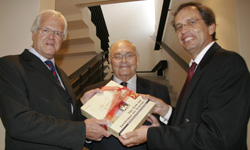Latest News Archive
Please select Category, Year, and then Month to display items
12 October 2020
|
Story Arina Engelbrecht
|
Photo Supplied
 Arina Engelbrecht from Organisational Development and Employee Well-being believes physical activity has a number of benefits for one’s health, including stress relief.
Arina Engelbrecht from Organisational Development and Employee Well-being believes physical activity has a number of benefits for one’s health, including stress relief.
Being physically active plays a big role in preventing the development of mental-health problems and in improving the quality of life of people experiencing mental-health problems.
Treatment for depression
Physical activity can be an alternative treatment for depression. It can be used as a stand-alone treatment or in combination with medication and/or psychological therapy. It promotes all kinds of changes in the brain, including neural growth, reduced inflammation, and new activity patterns are formed that promote feelings of calm and well-being. It releases endorphins – powerful chemicals in the brain that energise your spirit and make you feel good.
Physical activity can be very effective in relieving stress. Research in adults has found that physically active individuals tend to have lower stress levels compared to individuals who are less active. It also leads to improved sleep. When a person sleeps better and feels more rested, overall quality of life improves. They cope better with daily life stressors.
Reduce Alzheimer's risk
Regular physical activity can reduce your risk of developing Alzheimer's disease by up to 50%. It can also slow down further deterioration in those who have already started to develop cognitive problems. It stimulates the brain’s ability to maintain old connections as well as to make new ones.
A study asked people to rate their mood immediately after periods of physical activity (e.g. going for a walk/run, cycling, doing housework) and periods of inactivity (e.g. reading a book or watching television). Researchers found that participants felt more content, more awake, and calmer after being physically active compared to after periods of inactivity.
In conclusion, people who are physically active feel a sense of well-being, feel more energetic throughout the day, sleep better at night, have sharper memories, and feel more relaxed and positive about themselves and their lives.
“Being physically active not only changes your body, it changes your mind,
attitude, and your mood.” – Arina Engelbrecht
History book available from UFS Marketing
2007-02-01
 The university’s history book, "From Grey to Gold", is available from UFS Marketing.
The university’s history book, "From Grey to Gold", is available from UFS Marketing.
The book will soon be delivered to persons who have ordered copies of the book. UFS Marketing is in the process of distributing the books.
However, persons are also welcome to collect the book from Rinda Duraan or Ronél Meyer at the offices of UFS Marketing in the Wekkie Saayman Building.
Additional copies in Afrikaans or English are also available from UFS Marketing at R380 per copy. Please contact Ronél Meyer at X2150 or Rinda Duraan at X2143 for inquiries.
A proud 100 years
The history of the University of the Free State is one of faith, hope, struggle and determination. In the course of a century, and from a poor Free State community, the UFS has developed into a strong and mature university. This book, richly illustrated with photographs, tells its fascinating story, including:
-
Its establishment
-
The role of the founding fathers
-
Black pioneers of transformation
-
The establishment and development of academic departments and faculties; student numbers
-
Pioneers and trends in research; academic entrepreneurs
-
Campus issues; campus politics
-
The UFS’s place in socio-political changes
-
Student life: Rag, intervarsity and cheerleaders; sport and Springboks; hostel traditions
-
The admission of black students; anguish about race, language and culture
-
The story of “digs” and hostels, of Tin Town and the “Vlei”, Darkest Africa and the Red Square
-
The development of the campus, of the Tickey and the Banana
-
Of hardships in the founding years, good times and turn-around strategies
-
Community service and regional involvement and a new focus on the African continent.
Some interesting reading:
-
More than 500 pages
-
Hundreds of photographs
-
Appendices on office-bearers; awards and achievements (including national sporting colours)
-
A time-line situating the UFS’s history in the context of the history of the Free State, of South Africa and of the world